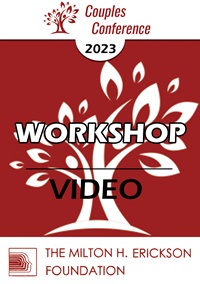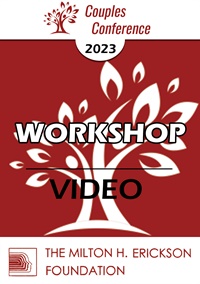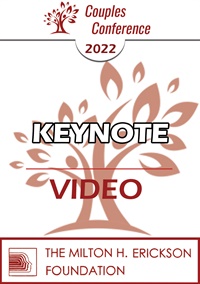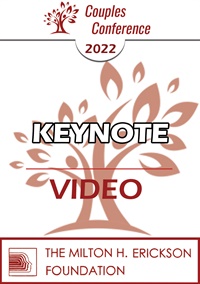
- Average Rating:
- Not yet rated
- Topic Areas:
- Workshops
- Bundle:
- Couples Conference 2023
- Categories:
- Couples Conference | Couples Conference 2023
- Faculty:
- Terry Real, LICSW
- Course Levels:
- Master Degree or Higher in Health-Related Field
- Duration:
- 1:20:18
- Format:
- Audio and Video
- Original Program Date:
- May 05, 2023
- Short Description:
- This workshop introduces participants to a new form of couples therapy – one that does deep individual work in the presence of the partner. Most of us, when faced in couples therapy with one or both partners needing trauma work or work on their characters refer these individuals to individual treatment. RLT offers a combination of loving confrontation (Joining through the truth), educational coaching on relational skills, and inner child work that, taken together, produce quick, profound, and lasting change. Any mental health professional or coach dealing with relational issues in his or her work. It is relevant to both couples therapists and individual therapists with a relational perspective. Anyone interested in how to integrate trauma work into couples therapy. Anyone wishing to go more deeply in their own clinical work.
- Price:
- $59.00 - Base Price

- Average Rating:
- Not yet rated
- Topic Areas:
- Workshops
- Bundle:
- Couples Conference 2023
- Categories:
- Couples Conference | Couples Conference 2023
- Faculty:
- Martha Kauppi, MS MFT
- Course Levels:
- Master Degree or Higher in Health-Related Field
- Duration:
- 2:00:39
- Format:
- Audio and Video
- Original Program Date:
- May 05, 2023
- Short Description:
- When faced with loss of attraction, clients and therapists alike often feel overwhelmed, confused, and disempowered. Attraction seems so mysterious, coming on quickly and going away just as suddenly. It is easy to believe attraction is out of our control. But restoring attraction is actually possible. In this workshop, Martha will show you how she uses several concepts and interventions from the Developmental Model of Couples Therapy to help clients identify what is blocking attraction, remove the blocks, and restore intimate connection. Expect a spirited combination of lecture, discussion, Q & A, and plenty of immediately applicable material you can take to your next session.
- Price:
- $59.00 - Base Price

- Average Rating:
- Not yet rated
- Topic Areas:
- Workshops
- Bundle:
- Couples Conference 2022
- Categories:
- Couples Conference | Couples Conference 2022
- Faculty:
- Sejal Patel, PsyD
- Course Levels:
- Master Degree or Higher in Health-Related Field
- Duration:
- 2:00:12
- Format:
- Audio and Video
- Original Program Date:
- Jun 26, 2022
- Short Description:
- For this workshop, we will briefly review research on discussing race related themes and concerns between interracial couples. The presenter will introduce 2-3 interracial couples currently in treatment with this provider and some presenting concerns around sociocultural identity differences, perspectives on social justice, and how the couple discussed or did not discuss microaggressions one partner of the couple experienced outside of the relationship. The presenter will address her own countertransference processes, how she conceptualized the conflicts, and how she addressed and facilitated dialogue between the couple. Participants will also have an opportunity to present their own cases, challenges moments, and questions they have regarding how to address race related presenting issues.
- Price:
- $59.00 - Base Price

- Average Rating:
- Not yet rated
- Topic Areas:
- Workshops
- Bundle:
- Couples Conference 2022
- Categories:
- Couples Conference | Couples Conference 2022
- Faculty:
- Ari Tuckman, PsyD
- Course Levels:
- Master Degree or Higher in Health-Related Field
- Duration:
- 2:00:37
- Format:
- Audio and Video
- Original Program Date:
- Jun 26, 2022
- Short Description:
- Dishonesty can damage relationships and undermine therapy, but honesty is hard, especially for some clients. And yet, for therapy to progress, romantic partners need to be able to navigate thorny discussions with honesty and respect—and couples therapists need to avoid getting roped into being the lie detector. Honesty and disclosure are an important part of effective therapy, but they are also an important goal to work towards. We will begin by discussing the different kinds of dishonesty, the purposes that they serve, and the impact that actual or suspected dishonesty has on the partner and relationship. Then we will discuss how to help clients build the skills to be able to be more honest with themselves, their partner, and their therapist, as well as how to help partners be better receivers of honest disclosure, so that both partners feel empowered to shift a dissatisfying dynamic.
- Price:
- $59.00 - Base Price

- Average Rating:
- Not yet rated
- Topic Areas:
- Workshops
- Bundle:
- Couples Conference 2022
- Categories:
- Couples Conference | Couples Conference 2022
- Faculty:
- Martha Kauppi, MS MFT
- Course Levels:
- Master Degree or Higher in Health-Related Field
- Duration:
- 2:02:19
- Format:
- Audio and Video
- Original Program Date:
- Jun 26, 2022
- Short Description:
- What kills desire in long-term relationships, and how do you help clients with desire discrepancy find one another again? Desire may be mysterious, but relational dynamics that block it--like pressure for sex, managing sex pain, and sexual performance issues--are very predictable. Learn how to identify and work effectively with these tough but common blocks so that desire can bloom again. You’ll gain clinical tools for depathologizing desire differences, starting a collaborative conversation about pleasure, and helping partners build the skills to stay flexible and connected through sexual challenges.
- Price:
- $59.00 - Base Price

- Average Rating:
- Not yet rated
- Topic Areas:
- Keynotes
- Bundle:
- Couples Conference 2022
- Categories:
- Couples Conference | Couples Conference 2022
- Faculty:
- Martha Kauppi, MS MFT
- Course Levels:
- Master Degree or Higher in Health-Related Field
- Duration:
- 1:01:08
- Format:
- Audio and Video
- Original Program Date:
- Jun 26, 2022
- Short Description:
- When it comes to sex issues, therapists are understandably concerned about crossing a boundary, making their clients uncomfortable, or getting outside of their scope of practice. However, when therapists shy away from bringing up sexuality, they may be missing serious (even life-threatening) issues. In this skill-building presentation, Martha will share her unique approach to bringing up sex, including how to follow up ethically and thoroughly once the topic is open. When should you refer or consult? Where is the line regarding scope of practice? What language will help both you and your clients feel comfortable? How much do you need to know about sex? How do you tell whether you’re dealing with relational issue or a sex issue? What should you focus on first? Discover the answers to these questions and more, and walk away with a set of tools you can apply in your very next session.
- Price:
- $59.00 - Base Price

- Average Rating:
- Not yet rated
- Topic Areas:
- Keynotes
- Bundle:
- Couples Conference 2022
- Categories:
- Couples Conference | Couples Conference 2022
- Faculty:
- Joseph Winn, MSW, LICSW, CST-S
- Course Levels:
- Master Degree or Higher in Health-Related Field
- Duration:
- 1:00:04
- Format:
- Audio and Video
- Original Program Date:
- Jun 26, 2022
- Short Description:
- The process of working with erotic transference and countertransference is often avoided in clinical practice and in the training of psychotherapists. As therapists we must recognize and address that erotic transference and countertransference are significant pathways, albeit uncomfortable topics steeped in fear and defensiveness, toward greater vulnerability, healing, and the potential for growth within the clients we treat and the clinicians we long to be. This keynote discussion will begin a conversation on the process of removing fear from topics traditionally avoided within the realm of normative psychotherapy practice and parameters for their exploration within a boundaried and ethical framework will be provided.
- Price:
- $59.00 - Base Price

- Average Rating:
- Not yet rated
- Topic Areas:
- Topical Panels
- Bundle:
- Couples Conference 2022
- Categories:
- Couples Conference | Couples Conference 2022
- Faculty:
- Joseph Winn, MSW, LICSW, CST-S | Sejal Patel, PsyD | Martha Kauppi, MS MFT
- Course Levels:
- Master Degree or Higher in Health-Related Field
- Duration:
- 1:01:35
- Format:
- Audio and Video
- Original Program Date:
- Jun 26, 2022
- Short Description:
- Extrinsic forces, centered in racism, classism, sexism, heteronormativity, ageism, ableism, and other intersecting identities impact relationships. However, they factors are not extrinsic, as we are all steeped in and operate from or are operated on, but these factors making them all too present and, unfortunately, made invisible to us as clinicians and the relational systems that we work with. The panel will define these factors, explore the power of their invisibility and impacts on relationships at the micro, mezzo and macros levels of experience and discuss their clinical implications on relational and systemic therapies.
- Price:
- $59.00 - Base Price

- Average Rating:
- Not yet rated
- Topic Areas:
- Topical Panels
- Bundle:
- Couples Conference 2022
- Categories:
- Couples Conference | Couples Conference 2022
- Faculty:
- Stan Tatkin, PsyD, MFT | Ari Tuckman, PsyD | Ellyn Bader, PhD
- Course Levels:
- Master Degree or Higher in Health-Related Field
- Duration:
- 1:00:34
- Format:
- Audio and Video
- Original Program Date:
- Jun 25, 2022
- Short Description:
- A review of the pitfalls of deception as applied to relationships including therapeutic approaches.
- Price:
- $59.00 - Base Price

- Average Rating:
- Not yet rated
- Topic Areas:
- Workshops
- Bundle:
- Couples Conference 2022
- Categories:
- Couples Conference | Couples Conference 2022
- Faculty:
- Tammy Nelson, PhD
- Course Levels:
- Master Degree or Higher in Health-Related Field
- Duration:
- 2:00:32
- Format:
- Audio and Video
- Original Program Date:
- Jun 25, 2022
- Short Description:
- Many therapists dedicate much therapy time helping betrayed partners heal deep emotional wounds in the wake of an affair. Therapy is often lopsided in a victim–perpetrator model, dealing with the injury of the betrayal. Less attention is typically paid to helping the partners who had the affair, one-night stand, or online infidelity, especially regarding why and how it happened. This workshop will give you a more nuanced understanding of the motivations for the infidelity and present practical interventions around the underlying meaning of the cheating and what it means about the relationship.
- Price:
- $59.00 - Base Price
Please wait ...

